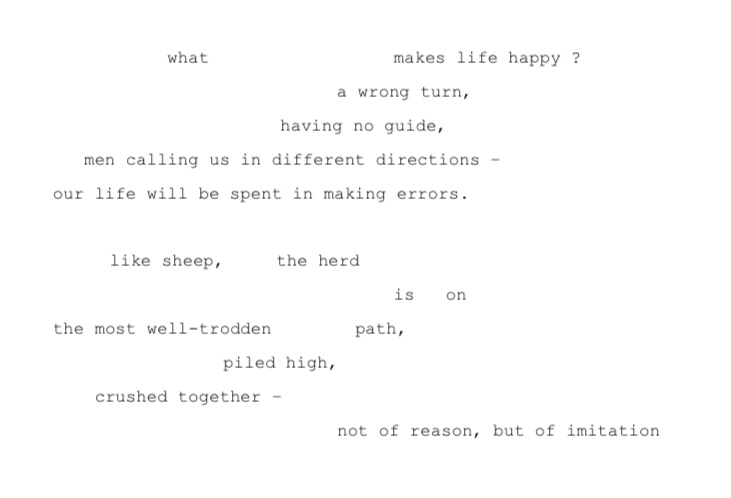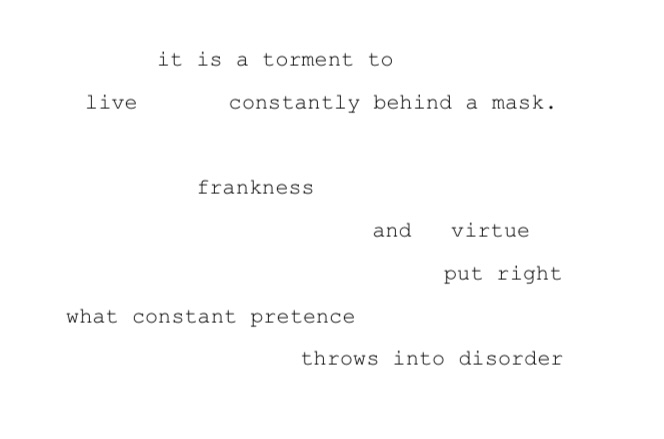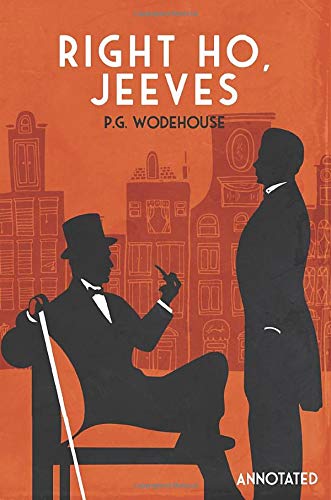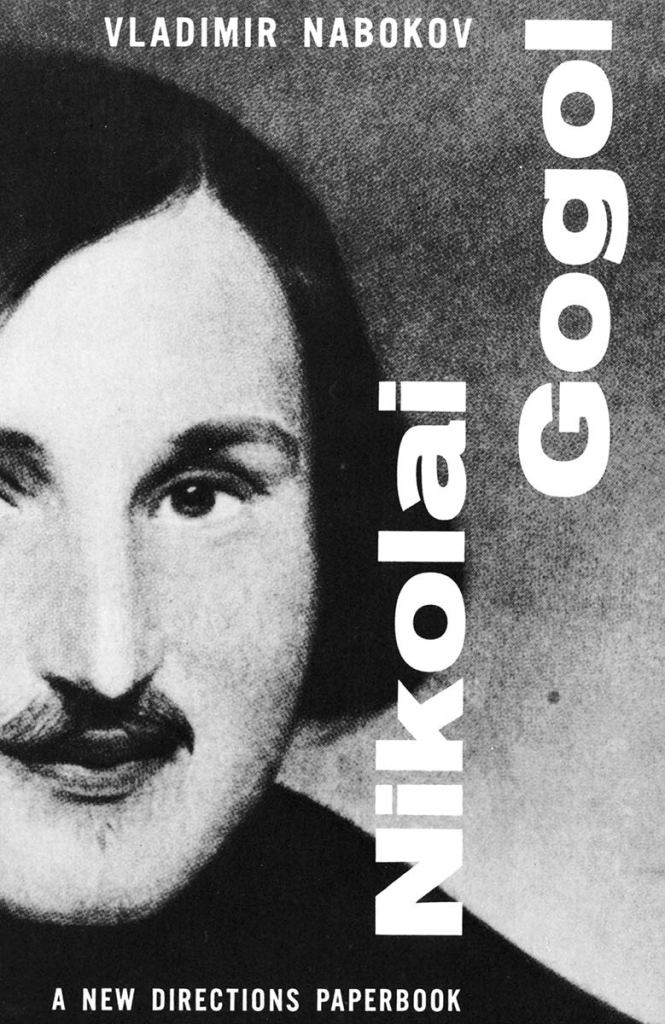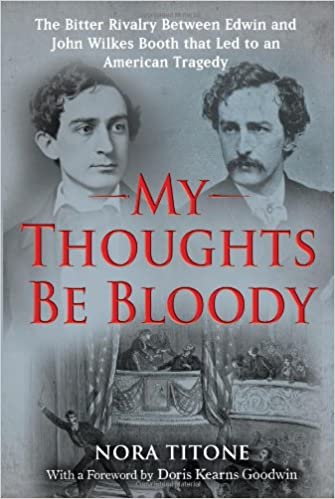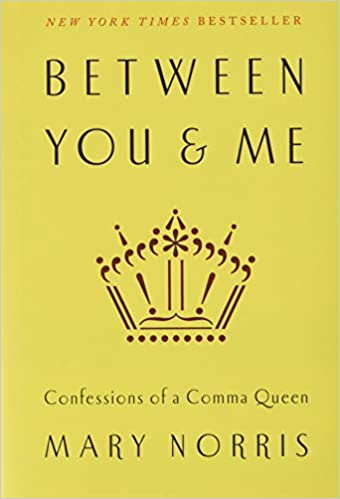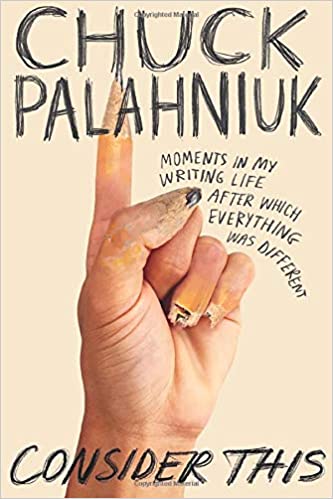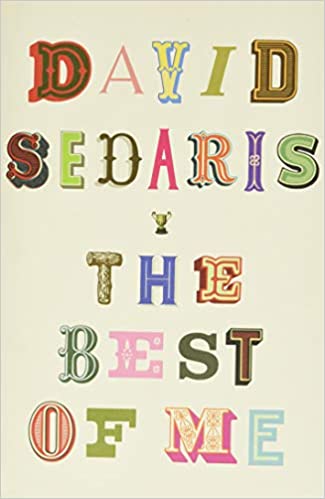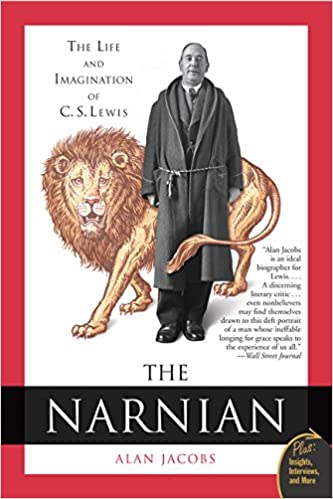It is such an odd experience to look back at books I read in the beginning of the year and think, That was this year?! Why does it feel so long ago? I thought this year went by quickly, but this sensation makes me think otherwise. So much happens in a year, I suppose. Looking at pictures of my nieces a year ago makes me wonder how they can grow and change so much in one year. Thinking back on where I was a year ago makes me feel like I’m in the weirdest version of Groundhog Day– the same, but oh so different. Time, man. It messes with you.
Anyway, as usual, I read some books this year, and here are my selections of the best of the bunch. Enjoy.
The Writing Life by Annie Dillard

This is a short book, but it’s one of my favorites of Dillard’s. Her energetic, impassioned writing is on display, and she is writing about something I have thought of and think of a lot: writing and making a life of writing. One of my favorite stories in the book is of a young student asking a professor if he thinks she could be a writer, to which he says, “That depends. Do you love sentences?” I’m not sure the student got it, but I do. To love sentences, words, punctuation, and grammar is not easy to explain– why are any of us drawn to the things we love?– but it’s real. This book is so good.
“One of the things I know about writing is this: spend it all, shoot it, play it, lose it, all, right away, every time. Do not hoard what seems good for a later place in the book or for another book; give it, give it all, give it now. The impulse to save something good for a better place later is the signal to spend it now. Something more will arise for later, something better. These things fill from behind, from beneath, like well water. Similarly, the impulse to keep to yourself what you have learned is not only shameful, it is destructive. Anything you do not give freely and abundantly becomes lost to you. You open your safe and find ashes.”
– Annie Dillard, The Writing Life
“Write as if you were dying. At the same time, assume you write for an audience consisting solely of terminal patients. That is, after all, the case. What would you begin writing if you knew you would die soon? What could you say to a dying person that would not enrage by its triviality?”
– Annie Dillard, The Writing Life
Death in Yellowstone by Lee H. Whittlesey

This book describes the various deaths that have occurred in Yellowstone National Park, both by nature and by humans: hot springs, bears, drownings, falls, rocks, murders, suicides, plane crashes, etc. My list of things I never want to do got much longer after reading this book. It emphasized the importance of using one’s head, not acting like nature is tame, and being prepared in case things go south. The worst can happen so quickly.
“The worst possible situation is a person hiking alone who surprises a bear that is feeding (as on a carcass) and also has cubs. If this last situation happens to you, we will not expect to see you back at the trailhead.”
– Lee H. Whittlesey, Death in Yellowstone
The Collected Works of Billy the Kid by Michael Ondaatje

This was an interweaving of stories about Billy the Kid (William Bonney) and fictional thoughts of his. It was short, but it was interesting, the myth and legend of a killer from age 12 to 21. I love this sort of book and this time period for some reason, and, having just read James Joyce’s Ulysses, I was able to recognize Joyce’s influence on both the stream of consciousness and plays on language.
“These are the killed.
(By them) –
Charlie, Tom O’Folliard
Angela D’s split arm,and Pat Garrett
sliced off my head.
– Michael Ondaatje, The Collected Works of Billy the Kid
Blood a necklace on me all my life.”
A Sultry Month: Scenes of London Literary Life in 1846 by Alethea Hayter

This thoroughly-researched book covers the summer of 1846 in London, based on letters passed between the literary and art circles, including Benjamin Haydon (the painter who killed himself that summer), Elizabeth Barrett (right before she married Robert Browning), Browning, Charles Dickens, Thomas Carlyle, and others. I love learning about the lives of people, so I found this book fascinating (though I don’t expect others to to the same degree).
“Wordsworth never said more than he really felt, which disconcerted many of his contemporaries; ‘Wordsworth does more to unidealise himself than any man I know,’ said John Kenyon, sadly.”
– Alethea Hayter, A Sultry Month
Six Memos for the Next Millennium by Italo Calvino
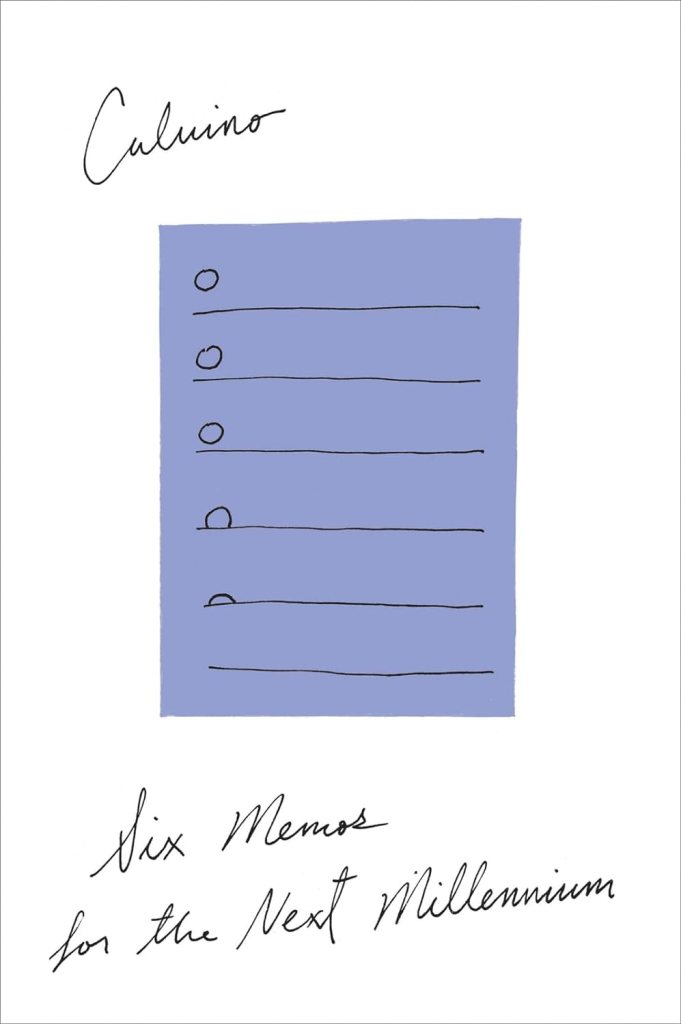
These lectures were going to be given at Harvard and are organized by topic: lightness, quickness, exactitude, visibility, and multiplicity. However, only five were completed by the time of Calvino’s death. I love his wide knowledge and interest in myth, folklore, and literature, both modern and ancient, and his perspectives on the various topics he covers are unique and interesting. This only made me want to read more of his novels and short stories.
“I think that my first impulse arises from a hypersensitivity or allergy. It seems to me that language is always used in a random, approximate, careless manner, and this distresses me unbearably. Please don’t think that my reaction is the result of intolerance towards my neighbor: the worst discomfort of all comes from hearing myself speak. That’s why I try to talk as little as possible. If I prefer writing, it is because I can revise each sentence until I reach the point where – if not exactly satisfied with my words – I am able at least to eliminate those reasons for dissatisfaction that I can put a finger on. Literature – and I mean the literature that matches up to those requirements – is the promised land in which language becomes what it really ought to be.”
– Italo Calvino, Six Memos for the Next Millennium
“I know that every interpretation of a myth impoverishes and suffocates it; with myths, it’s better not to rush things, better to let them settle in memory, pausing to consider their details, to ponder them without moving beyond the language of their images. The lesson we can draw from a myth lies within the literality of its story, not in what we add to it from without.”
– Italo Calvino, Six Memos for the Next Millennium
Marriage Bureau by Mary Oliver and Mary Benedetta

I came across this book while searching for books by the poet Mary Oliver, and though this Mary Oliver is different, the book sounded intriguing. It is about the first dating/matchmaking service in London in the 1940s, and I loved hearing the stories of the type of people who sought a match, the types of things they wanted/liked/didn’t like in a partner, the successes, the oddballs, the challenges, the lessons, etc. This was so up my alley– studying people, trying to find what is best for them as individuals, even improving them when possible. I am happy I stumbled upon this book.
“Young men wander aimlessly through life, hoping that by some happy chance they’ll meet the girl of their dreams. Girls sit at home waiting for ‘Mr Right’, a nostalgic fantasy invented by their parents. There has to be a better way.”
– Mary Oliver and Mary Benedetta, Marriage Bureau
Mama’s Last Hug: Animal Emotions and What They Tell Us about Ourselves by Frans de Waal

This book covers animal emotions from both research/scientific studies and anecdotes, as the author has studied animals for his entire career. It made so much more sense to me than the arguments I have heard in the past that humans are the only creatures with consciousness, emotion, impulse control, forward thinking, etc. As de Waal argues, animals have all of the above and are much more similar to us than we have granted in the past. I love it.
“Nevertheless, scholars keep obsessing about selfish motives, simply because both economics and behaviorism have indoctrinated them that incentives drive everything that animals or humans do. I don’t believe a word of it, though, and a recent ingenious experiment on children drives home why. The German psychologist Felix Warneken investigated how young chimpanzees and children assist human adults. The experimenter was using a tool but dropped it in midjob: would they pick it up? The experimenter’s hands were full: would they open a cupboard for him? Both species did so voluntarily and eagerly, showing that they understood the experimenter’s problem. Once Warneken started to reward the children for their assistance, however, they became less helpful. The rewards, it seems, distracted them from sympathizing with the clumsy experimenter. I am trying to figure how this would work in real life. Imagine that every time I offered a helping hand to a colleague or neighbor—keeping a door open or picking up their mail—they stuffed a few dollars in my shirt pocket. I’d be deeply offended, as if all I cared about was money! And it would surely not encourage me to do more for them. I might even start avoiding them as being too manipulative. It is curious to think that human behavior is entirely driven by tangible rewards, given that most of the time rewards are nowhere in sight. What are the rewards for someone who takes care of a spouse with Alzheimer’s? What payoffs does someone derive from sending money to a good cause? Internal rewards (feeling good) may very well come into play, but they work only via the amelioration of the other’s situation. They are nature’s way of making sure that we are other-oriented rather than self-oriented.”
– Frans de Waal, Mama’s Last Hug
In the Heart of the Sea by Nathaniel Philbrick

This book tells the true story of the whaleship Essex, the story that inspired Melville’s Moby-Dick. In 1819, the Essex set sail from Nantucket and ended up being rammed– intentionally– by an 80-ton bull sperm whale. The crew had to use three small whaling boats to try to find land, but, instead of heading to nearby islands for fear of cannibalism, they sailed for South America. Ninety days later, the few who had barely survived (resorting to, ironically, cannibalism) were saved. This was a harrowing, fascinating account that was not only well-written but also makes Moby-Dick come even more alive.
“Modern survival psychologists have determined that this ‘social’—as opposed to ‘authoritarian’—form of leadership is ill suited to the early stages of a disaster, when decisions must be made quickly and firmly. Only later, as the ordeal drags on and it is necessary to maintain morale, do social leadership skills become important.”
– Nathaniel Philbrick, In the Heart of the Sea
Life among the Savages by Shirley Jackson

This book about Jackson’s three children (four by the end) was so charming that I told my mom to read it. Jackson’s timing in her writing is so spot-on for perfect delivery of dry, subtle wit. The book was hilarious. Her son’s orneriness, her second daughter’s seven imaginary stepdaughters, her third daughter’s attempt to keep up, her husband’s resignation to the chaos– I love it all and now want to read her second book about her children.
“Our house is old, and noisy, and full. when we moved into it we had two children and about five thousand books; I expect that when we finally overflow and move out again we will have perhaps twenty children and easily half a million books; we also own assorted beds and tables and chairs and rocking horses and lamps and doll dresses and ship models and paint brushes and literally thousands of socks.”
– Shirley Jackson, Life among the Savages
The Overcoat and Other Russian Tales by Nikolai Gogol

This collection of Gogol’s stories was very funny– not in a laugh-out-loud way, but in a tickled sort of way. Misunderstandings abound; lessons are not learned. It was nice to read these after reading Nabokov’s Gogol, which gave me some context, background, and commentary.
“At the end of the table, the secretary was reading the decision in some case, but in such a mournful and monotonous voice, that the condemned man himself would have fallen asleep while listening to it. The judge, no doubt, would have been the first of all to do so, had he not entered into an engrossing conversation while it was going on.”
– Nikolai Gogol, The Overcoat and Other Russian Tales
On the Marble Cliffs by Ernst Jünger
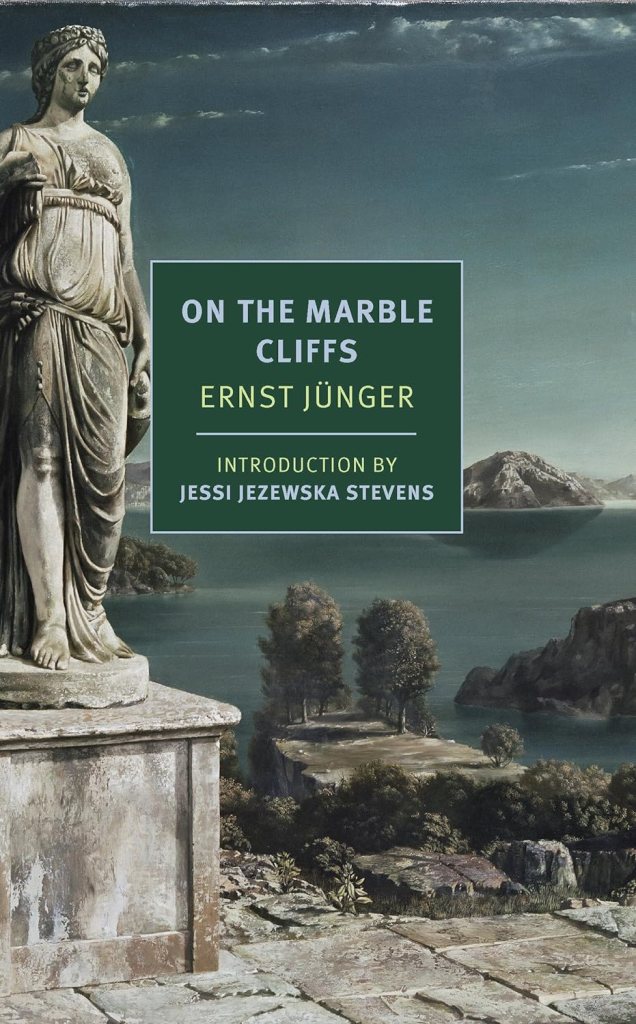
This brief book is meditative yet devastating, portraying the destruction of a beautiful seaside town due to its own moral and traditional decay and the terror of the Head Forester, who uses the internal breakdown to his advantage. The brothers at the center of the narrative study flowers and plants in their retreat in the cliffs, but everything (their work, their friends, their home) goes up in flames at the end. They survive and make it across the water to safety and the welcome of another friend, but they lose and learn so much in the process. A beautiful book and allegory.
“We cannot count on seeing our work completed here below, and happy is the man whose will is not too painfully invested in his efforts. No house is built, no plan created, in which ruin is not the cornerstone, and what lives imperishably in us does not reside in our works.”
– Ernst Jünger, On the Marble Cliffs
The Violent Bear It Away by Flannery O’Connor

Per the summary in Hoopla (the app I use to listen to audiobooks), “the orphaned Francis Marion Tarwater and his cousin, Rayber, defy the prophecy of their dead uncle– that Tarwater will become a prophet and will baptize Rayber’s young son, Bishop.” Rayber wants to show Tarwater the more “reasonable” life outside of faith, and Tarwater struggles against himself. The innocent, mentally disabled Bishop is at the center. It is an engrossing, sad, thought-provoking book.
“Its face was like the face she had seen in some medieval paintings where the martyr’s limbs are being sawed off and his expression says he is being deprived of nothing essential.”
– Flannery O’Connor, The Violent Bear It Away
South of No North by Charles Bukowski

This collection of short stories was exactly what I would expect: dirty, reeking of booze, unhappy, irreverent, and oddly intelligent. Bukowski loves and hates women; he loves alcohol and knows it’s killing him; he hates work but occasionally does it anyway. One of the lines of a story sticks in my brain: the narrator suddenly gets famous for a minute, walks into a party in his favor, sees the women and “wants to rape all of them.” Instead, he gets drunk and wakes up alone hours later. That could sum up the gist of all these stories.
“Hospitals and jails and whores: these are the universities of life. I’ve got several degrees. Call me Mr.”
– Charles Bukowski, South of No North
Quietly Hostile by Samantha Irby

This is Irby’s fourth book, and I have read all of them. I was afraid of not liking this one– of it being too “woke” or boring because she’s told her best stories by now or something. But it actually felt like listening to a good friend tell me stories; I really enjoyed it. Irby is self-deprecating and funny, so even an essay that could have gotten political (about COVID) remained about her and her own idiosyncratic way of dealing with it. I’m happy I read this.
“I’m so embarrassed by everything all the time, humiliated even by the need to breathe air where other people can see me.”
– Samantha Irby, Quietly Hostile
“Diseased Brain is louder and meaner– and, if we’re being honest, funnier– than Regular Brain, and the only tool I have to shout it down is one I developed called ‘Wedding Guest,’ which mostly involves repeating ‘You are not the bride’ over and over to myself when I get overwhelmed about being seen by other human eyes and only have greasy sweatshirts at my disposal to present myself in.”
– Samantha Irby, Quietly Hostile
Sir Gawain and the Green Knight by Anonymous

I love the movie The Green Knight and felt I should read the original poem. It differs from the movie in that its focus is on the tests of Gawain’s chastity while staying at the castle on his way to see the Green Knight. The lady of the house tempts him three days in a row, and on the third day she gives him a green sash to protect him. He does not tell the lord of the house about it, despite their agreement to share everything, and his failure comes to light when facing the Green Knight, who is actually the lord. Gawain must carry his cowardice home (he is not killed that day). It’s an interesting reversal of the movie version.
“Why should I not defy
Destinies strong and dear;
What can man do but try?”
– Sir Gawain and the Green Knight
The Curtain: An Essay in Seven Parts by Milan Kundera

This was such a good book about the art of the novel. Every section had insight on art, history, novelists, kitsch, life, etc. I would have been highlighting like mad if I hadn’t listened to the audiobook version. (The “curtain” is the readymade perception of the world that the novelist must rip to reveal what’s behind it.) I would highly recommend it.
“What does it mean to demonstrate in the streets, what is the significance of that collective activity so symptomatic of the twentieth century? In stupefaction Ulrich watches the demonstrators from the window; as they reach the foot of the palace, their faces turn up, turn furious, the men brandish their walking sticks, but ‘a few steps farther, at a bend where the demonstration seemed to scatter into the wings, most of them were already dropping their greasepaint: it would be absurd to keep up the menacing looks where there were no more spectators.’ In the light of that metaphor, the demonstrators are not men in a rage; they are actors performing rage! As soon as the performance is over they are quick to drop their greasepaint! Later, in the 1960s, philosophers would talk about the modern world in which everything had turned into spectacle: demonstrations, wars, and even love; through this ‘quick and sagacious penetration’ (Fielding), Musil had already long ago discerned the ‘society of spectacle.’”
– Milan Kundera, The Curtain
Internal Time: Chronotypes, Social Jet Lag, and Why You’re So Tired by Till Roenneberg

I saved this to my reading list years ago but just now got around to reading it. It was great– the author is a researcher of internal time, so he goes into so much research regarding the different chronotypes (early/late), the effects of the environment on our internal clocks, the consequences of living against our own internal clocks, and so much more. It helped me understand myself better and to understand my husband better, too (we have very different chronotypes, as many couples probably feel they do). This is a fascinating topic. I would highly recommend this book.
“Your internal time is produced by your own body clock. It varies from individual to individual just as body height, eye color, or personality varies, and it interacts with sun time and social time. In spite of internal time being probably the most important to our health and well-being–more important than sun time and certainly more important than social time–it has been thoroughly neglected.”
– Till Roenneberg, Internal Time
“Once enlightened, they started to understand themselves (and others) much better, began to appreciate their own individual time, and were suddenly relieved of the weight of prejudice ridiculing their temporal habits: for example, being called lazy if you don’t wake up fresh as a daisy by seven o’clock in the morning; or being called a boring person only because you don’t enjoy going out with friends after ten at night.”
– Till Roenneberg, Internal Time
Man’s Search for Meaning by Viktor Frankl

I have been afraid to name this as one of the most impactful books of my life since I first read it in college because it feels like such a cliché: this book makes it on every “top books you should read in your lifetime” list. However, I had to read it this semester for a class, and visiting it again after 15 years revealed to me how much I had either internalized from the book or had learned for myself in that time because so much of what is in the book I have espoused to others (regarding suffering, meaning, the ridiculousness of “collective guilt,” paradoxical intention, etc.). I love Frankl and think that so many people would benefit from reading this book. This deserves its place on all the reading lists it’s on.
“Dostoevski said once, ‘There is only one thing that I dread: not to be worthy of my sufferings.’ These words frequently came to my mind after I became acquainted with those martyrs whose behavior in camp, whose suffering and death, bore witness to the fact that the last inner freedom cannot be lost. It can be said that they were worthy of their sufferings; the way they bore their suffering was a genuine inner achievement. It is this spiritual freedom —which cannot be taken away-that makes life meaningful and purposeful.”
– Viktor Frankl, Man’s Search for Meaning





